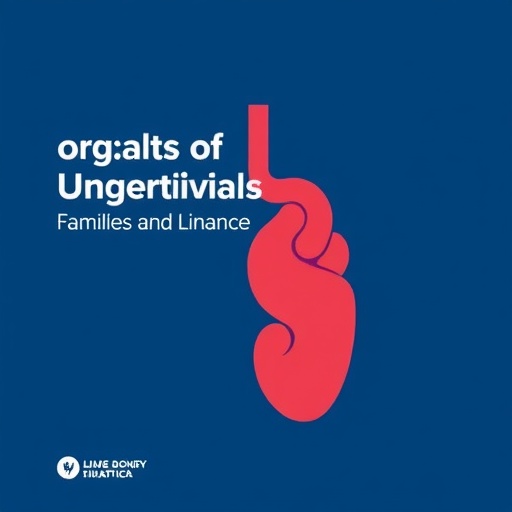The landscape of organ transplantation is both complex and evolving, with numerous dilemmas facing the medical community and society at large. In a detailed examination of this issue, researchers Cmunt and Grobmeier delve into the often-overlooked implications of organ underutilization. Their work not only highlights the potential benefits of optimizing organ usage but also critically assesses the ethical ramifications that come into play, especially concerning donor families and financial stakeholders. This exploration reaches far beyond mere statistics and delves into the deeply human aspects of donation and transplantation.
At the heart of the discussion is the sobering reality that a significant percentage of available organs are not utilized. Data indicate that nearly 20% of donor organs remain untransplanted, which raises questions about the systemic issues that contribute to this underutilization. The research team employs a mixed-methods approach, gathering qualitative data from interviews with healthcare professionals and analyzing quantitative data from organ transplant registries. This method allows them to create a well-rounded narrative on the factors contributing to organ wastage, including logistical challenges, medical criteria disparities, and varying levels of awareness among medical professionals.
One of the critical factors identified by the researchers is the discrepancy in medical criteria used for organ eligibility. Many organs deemed “marginal” or “high-risk” due to factors like age, medical history, or the presence of certain conditions are often overlooked despite their viability for transplantation. This highlights an inherent tension within the transplant community — balancing the potential benefits for recipients while considering the ethical implications for donor families who have navigated the emotional landscape of loss. Trust in the medical system is paramount, and if families perceive that their loved ones’ organs are not being utilized to their full potential, it could lead to increased skepticism about the system.
Furthermore, the paper raises the vital question of how financial stakeholders are affected by organ underutilization. A lack of awareness and understanding regarding the value of each transplant can have far-reaching economic implications. Hospitals and healthcare organizations may struggle financially due to missed opportunities for transplantation, which can contribute to a larger systemic issue within healthcare funding and resource allocation. The authors argue that both the medical community and financial stakeholders must establish a cohesive strategy to minimize organ wastage.
Ethical considerations are woven tightly into the narrative, focusing particularly on the emotional ramifications for donor families. Cmunt and Grobmeier emphasize that families may find themselves in an agonizing limbo when the organs of their loved ones are not utilized. This unreconciled grief can manifest in feelings of helplessness and moral distress. Furthermore, the authors explore the societal implications, suggesting that communities must engage in open conversations about organ donation to foster a broader understanding of the issues at play.
In exploring potential solutions to organ underutilization, the researchers advocate for enhanced education and training for transplant teams. By providing better understanding and resources, medical professionals can make informed decisions on the suitability of organs for transplantation. The team believes that embracing a more open mindset towards organ viability could lead to increased patience in transplant waiting lists and ultimately save more lives. Moreover, they highlight the importance of integrating family wishes and narratives into the conversation surrounding organ use, reinforcing the personhood of organ donors rather than reducing them to mere statistics.
Additionally, Cmunt and Grobmeier stress the necessity for policy reform at the legislative level concerning organ procurement and distribution. Existing policies may inadvertently incentivize underutilization through rigid criteria that limit the scope of viable organs. Adopting a more flexible and inclusive approach could drastically enhance organ utilization rates, bridging the gap between potential donors and waiting recipients. Collaboration among stakeholders across the healthcare sector is vital to create a cohesive framework that encourages optimized organ use.
The paper concludes with a poignant call to action, urging all parties involved — from healthcare providers to policymakers to families — to engage in continuous dialogue about the intricate dynamics of organ donation and transplantation. This dialogue not only addresses the immediate challenges of underutilization but also acknowledges the ethical imperatives that compel us to act. Creating an awareness-rich culture surrounding organ donation can alleviate some of the systemic barriers and foster a more compassionate society.
Through rigorous research and thoughtful analysis, the work of Cmunt and Grobmeier serves as a catalyst for change in the field of organ transplantation. Their findings underscore the need for a multifaceted approach to organ utilization — one that is not solely driven by medical or financial considerations, but by a deep respect for the lives affected by this critical junction of humanity. The dialogue they foster is essential to building a more effective and ethically sound organ transplant system — one that remembers the human stories behind every organ, ensuring that no opportunity is wasted.
In summary, the research provides significant insights into the multifactorial nature of organ underutilization while compelling us to address the emotional and ethical dilemmas faced by donor families and healthcare stakeholders. As society continues to navigate the complexities of organ donation, the imperative remains to optimize the process, ensuring that every organ has a chance to save a life.
Subject of Research: Effects of Organ Underutilization
Article Title: The Far-Reaching Effects of Organ Underutilization: Considering the Ethical Implications for Donor Families and Financial Stakeholders
Article References:
Cmunt, J.K., Grobmeier, C. The Far-Reaching Effects of Organ Underutilization: Considering the Ethical Implications for Donor Families and Financial Stakeholders.
Curr Transpl Rep 12, 21 (2025). https://doi.org/10.1007/s40472-025-00476-6
Image Credits: AI Generated
DOI:
Keywords: Organ transplantation, underutilization, ethical implications, donor families, financial stakeholders.




